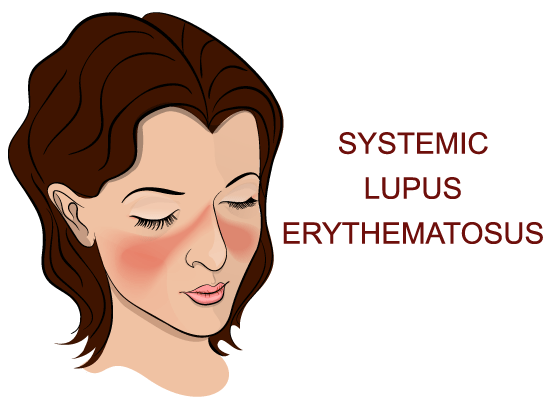108 Glen Osmond Road, Parkside

Systemic lupus erythematosus (SLE) is an autoimmune disease. In this disease, the immune system of the body mistakenly attacks healthy tissue. It can affect the skin, joints, kidneys, brain, and other organs.
Causes of SLE :-
The Systemic Lupus Erythematosus may be associated with different factors but the exact cause of this disease is exactly not known. The different factors on which it may depend are:
* It may depend on family history as if somebody in your family is having any type of autoimmune disease. Then you may be at risk of developing systemic lupus erythematosus.
Symptoms vary from person to person, and may come and go. Everyone with SLE has joint pain and swelling at some time. Some develop arthritis. SLE often affects the joints of the fingers, hands, wrists, and knees. Other common symptoms include:
Other symptoms depend on which part of the body is affected:
Some people have only skin symptoms. This is called discoid lupus.
Ayurvedic View of SLE :-
SLE can be related to Visharpa and Amavata because we see many similarities in the signs and symptoms of the diseases. Visharpa is a disease that spreads in different routes which is similar to SLE as both are invasive in nature. Amavata is a disease in which aggravated doshas entering into sacral joints cause stiffness of the whole body due to pain. The visharpa pervading through internal channels produces cardiac dysfunction, fainting, compression of vessels, excessive thirst, digestive inactivity, and general debility. This refers to multisystem involvement with dysfunction of vital organs. This encroaches its impact on CVS, CNS, respiratory system, blood vessels, renal function, and GIT signifying the multi-system invasion by infective organisms due to rapid loss of immunity. So, SLE there is vitiation of the three doshas and it spreads all through the body.
Pathophysiology :-
In Ayurveda there are three doshas (Vata, Pitta, and Kapha) that are responsible for systemic lupus erythematosus. Mainly Vata dosha is aggravated in this disease. The dhatus that are disturbed in this disease are twak, ras, rakta, & mansa. When the doshas are aggravated it causes vitiation of agni (body fire) & leads to ama (toxins) formation. These aggravated doshas carries the ama and other doshas into ras & rakta dhatu that ultimately lead to formation of SLE (systemic lupus erythematosus). As the doshas goes deeper into the tissues more it become difficult to treat.
Treatment for SLE (Lupus) in Ayurveda :-
The goal of treatment is to control symptoms. Severe symptoms that involve the heart, lungs, kidneys, and other organs often need treatment from specialists. Each person with SLE needs evaluation regarding:
* How active the disease is
In Ayurveda, the treatment is first detoxification of the body by removing the vitiated doshas from the body and this achieved through panchakarma therapy.
It needs to be treated with Tridosha Shamak herbs like Giloy, Amalaki, Yasthimadhu.
As it is mentioned in Amavata the cause is also the weak digestive fire(Mandagni). We need to increase the digestive fire(Agni) by giving herbs which are good for increasing digestive fire(deepaniyagana).
Food is medicine. If we can restrict our diet and food habits we can remain safe from S. Lupus.
Many a times a patient may be disease free from SLE for long periods but his pathological reports especially Antibodies [ANA] may not show much difference. Having high antibodies determines compromised immune symptom but in no way labels one as diseased. From my clinical experience of treating patients of Autoimmunity I am putting forth certain easy protocols which if followed would definitely help in a good quality of life. It has been observed that patients go into complete remission and in many cases the Antibodies [ANA] become negative. This still may indicate a very good control but must not be taken as a disease free state as immunity is subjective to environment around us and our response and if protocols are broken , it may severely relapse.
The unpredictable exacerbations, remissions (flares) and recurrances can be effectively managed through Ayurveda, but it is advised to take the help of allopathy in aggressive stages of the disease. Once the disease is stabilized then switch on to Ayurveda for the best management of the conditions. Please contact Ayurvedic Consultants at Life Line Ayurvedic Herbal Clinic to find out effective ways to treat SLE.
Disclaimer : Sandeep Kumar and Anupam Vasudeva are not GP, they have Ayurveda medical degree from India where it is considered equal to any other medical degree. This qualification is recognized in Australia by vetassess governing body as Complementary Health Therapists. Life Line Ayurvedic Herbal Clinic does not claim to cure a disease or terminal illness and does not create any unreasonable expectation of beneficial treatment. Ayurvedic medicines and treatments are generally considered to be safe but rarely may be associated with possible adverse reactions in individual cases. We recommend seeking urgent medical attention in the case of an adverse reaction. This website provides you with information. You must contact your Ayurvedic or another health professional before you apply them. Read More